The Significance of Dragon Eggs in Game of Thrones

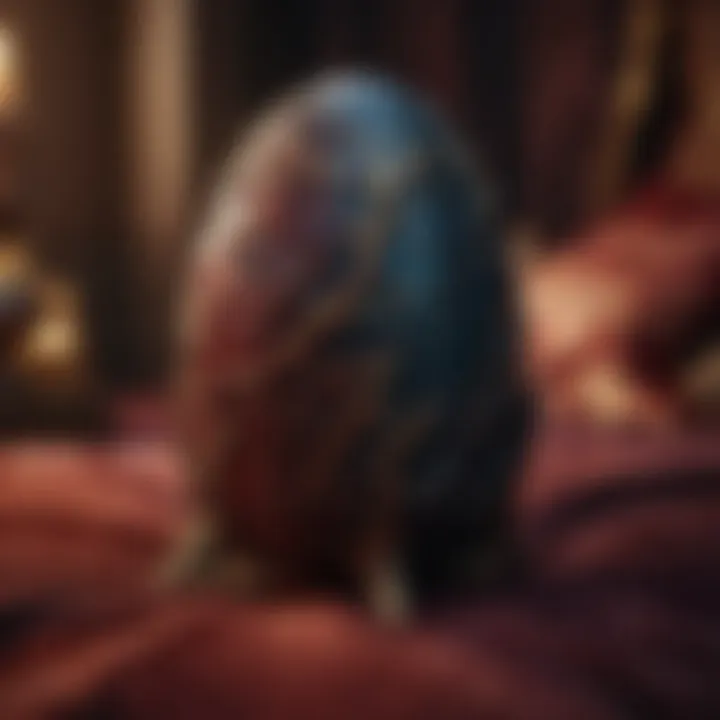
Intro
Dragon eggs hold a distinct place in the lore of Game of Thrones, serving not only as rare physical objects but also as potent symbols within the narrative. They encapsulate themes of power, legacy, and the elemental struggle for dominance in Westeros. Throughout the series, dragon eggs carry significant weight, influencing character decisions and shaping the overarching storyline.
Character Dissections
Daenerys Targaryen
Daenerys Targaryen's character arc is intricately tied to the presence of dragon eggs. Her journey from a meek girl to a powerful leader is significantly marked by her discovery of the eggs in the House of the Undying. The eggs represent her heritage as the last living Targaryen, a lineage once renowned for its dragons.
- Symbol of Legacy: For Daenerys, the eggs embody the hope of revival for her family's claim to the Iron Throne. As she grows in power, the eggs symbolize her determination to restore her family's legacy.
- Character Development: Throughout the series, Daenerys evolves from a pawn in her brother's game to a fierce warrior. The hatching of her dragons marks a pivotal moment in her transformation. The bond that forms between her and the dragons showcases her nurturing spirit and undeniable ambition.
Viserys Targaryen
Contrastingly, Viserys Targaryen's approach to the dragon eggs illustrates a more entitled perspective.
- Desperation and Entitlement: Viserys's desire for power drives his treatment of the eggs. He sees them merely as tools for reclaiming the Iron Throne. His approach ultimately leads to his downfall, as he fails to understand the deeper significance of the Targaryen legacy.
- Impact on Overarching Storyline: The contrast between Daenerys and Viserys underscores the theme of rightful versus wrongful claims to power. Viserys’s demise also serves as a turning point in Daenerys's characterization, emphasizing her growth in leadership qualities.
Episode Breakdowns
Season 1: The Preamble of Dragon Eggs
In the first season, viewers are introduced to the dragon eggs when Daenerys receives them as a gift at her wedding. Their significance is hinted at through the rituals and traditions surrounding Targaryens, awakening curiosity about their potential.
Season 6: The Hatchings
As Daenerys's journey continues, the hatching of her dragons becomes one of the most crucial moments of the series. This event not only signifies her ascendancy but also marks her as a key player in the political landscape of Westeros.
“Fire and blood.” – House Targaryen motto, reflecting their history of power struggles and the role of dragons.
Lore Explorations
The Mythical Status of Dragons
Dragons in Westeros are not merely creatures but symbols of Targaryen power. Their history offers insights into the family's past and the catastrophic fall from grace that led to their near extinction. The eggs serve as a tangible connection to this lore, embodying the myths and stories told throughout the Seven Kingdoms.
Connection to Valyria
The connection between dragon eggs and Valyria is vital. It points to the depths of Targaryen ancestry and highlights the loss of power after the Doom of Valyria. Understanding this context enriches the viewer's interpretation of character motivations and the stakes of power within the series.
Fan Theories
The Nature of the Eggs
There are intriguing theories among fans regarding the true nature of the dragon eggs. Some speculate that the eggs hold more than just dragons; they may contain ancient magic or represent different attributes of power itself.
Possible Future Eggs
As the series progresses, fans ponder about the potential for new dragon eggs. Will they hatch? What will this mean for power dynamics within Westeros? These questions keep the audience engaged and invested in the narrative's complexities.
Prolusion to Dragon Eggs
Dragon eggs hold a pivotal role within the narrative framework of Game of Thrones, acting as a symbol of power, heritage, and transformation. Understanding their significance sets the foundation for deeper explorations of character arcs and thematic elements throughout the series.
Many fans recognize dragon eggs as vital artifacts that embody the cultural legacy of House Targaryen. This royal lineage is intricately tied to dragons and signifies a claim to authority and dominion over Westeros. The eggs are not mere objects; they represent the hopes and expectations of a house seeking to reclaim its former glory and assert its influence within a politically fragmented realm.
The importance of dragon eggs also extends beyond physical appearances. They encapsulate the themes of rebirth and potential that run through the series. The act of hatching dragon eggs can be seen as a metaphor for renewal and the fiery resurgence of ancient powers that had long been thought extinct. They are consequential plot devices that significantly impact the development of key characters, especially Daenerys Targaryen, who undergoes profound changes as events unfold.
By analyzing dragon eggs, we gain insights into their complex symbolism and the narrative weight they carry. They serve as a focal point in discussions of power dynamics, legacy, and identity. As such, dragon eggs warrant closer examination to fully appreciate their multifaceted roles in the Game of Thrones universe. This exploration will feed into broader discussions on the cultural and philosophical implications present in the story.
Mythical Origins of Dragons
The mythical origins of dragons lay the groundwork for their significance in Game of Thrones. These foundations help to build a deeper understanding of the narrative arcs, character motivations, and the symbolism represented by dragon eggs throughout the series. The fascination with dragons in various cultures enhances the depth and appeal of these creatures, making them central to the story. The cultures that birthed these myths often infused dragons with power, fear, and wisdom, all of which resonate in Westeros’s portrayal of dragons.
Early References in Literature

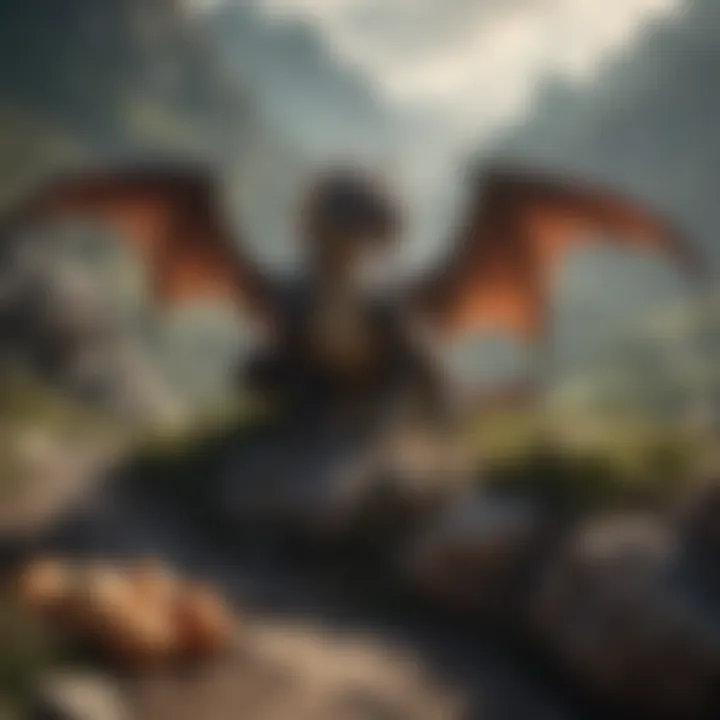
Dragons have been part of human mythology for centuries. They appear in ancient texts and folklore across the world, from the dragons of Greek mythology to the serpents found in Mesopotamian legends. Notably, the Epic of Gilgamesh introduces the first known dragon, a creature embodying both might and terror.
In Western literature, dragons often symbolize chaos and danger. They guard treasures, manifesting the very essence of greed and strength. This idea shaped the perception of dragons as formidable adversaries, as well as wise guardians of wisdom and wealth. In the context of Game of Thrones, the Targaryens’ dragons echo these older legends. They are portrayed as both assets and harbingers of destruction.
Here are some notable references to dragons in earlier literature:
- Beowulf: Features a dragon that becomes a significant adversary, highlighting themes of mortality and the cyclical nature of life.
- The Bible: Mentions the dragon in Revelation, symbolizing evil and chaos.
- Norse Mythology: Includes Fafnir, a dragon transformed from a greedy man, illustrating the corrupting nature of greed.
These references help frame the narrative within Game of Thrones, where the dragon eggs emerge as a link to this ancient lore.
The Role of Dragons in Westeros Folklore
In the Game of Thrones universe, dragons serve multifaceted roles in the folklore of Westeros. They are often represented as mythical creatures possessing abilities far beyond that of humans. The Targaryens, in particular, embraced these creatures as symbols of their lineage and power. The tales of Aegon the Conqueror, riding Balerion the Black Dread, cemented dragons as pivotal figures in achieving dominance over the Seven Kingdoms.
Additionally, dragons in Westeros embody the duality of creation and destruction. They are revered and feared, representing the potential for both salvation and annihilation. The narrative surrounding dragon eggs speaks volumes about this complex relationship. They are not merely relics; they symbolize heritage, the struggle for power, and the burden of legacy that the Targaryens carry.
"Dragons are not just creatures, they are the very essence of Targaryen culture and history, holding within their eggs the hopes and sorrows of their bloodline."
This intricate weave of history, myth, and symbolism resonates with audiences and enriches the Game of Thrones experience. It invites further exploration into the implications of dragons and their eggs within the broader themes of power and legacy as the series evolves.
The House Targaryen Connection
The House Targaryen, known for its deep-rooted association with dragons, plays a crucial role in understanding the significance of dragon eggs in the Game of Thrones universe. This connection is not merely superficial; it encompasses the birthright, identity, and destiny of the entire family line. The Targaryens view dragons as extensions of their bloodline and as embodiments of their power. This has implications for their rule, their ability to instill fear, and their right to govern the Seven Kingdoms.
Targaryen Heritage and Dragons
Dragons have been synonymous with House Targaryen since Aegon the Conqueror united Westeros. The Targaryens are considered the dragonlords, and their history is interwoven with these mythical creatures from the very beginning. The family’s lineage includes Aegon, who rode Balerion the Black Dread, and Daenerys, who, despite being the last of her kind, seeks to reclaim that legacy through her own dragons.
The importance of dragons to the Targaryens cannot be overstated. They represent strength, authority, and the ability to instill loyalty in their followers. The dragons are more than pets or beasts; they are crucial to Targaryen identity. As a result, dragon eggs carry immense significance. They symbolize the potential for rebirth and the continuation of their legacy. With each egg, there is a promise of new life, a dragon that could once again allow the Targaryens to assert themselves as rulers.
Symbolism of Dragon Eggs in Targaryen Culture
In Targaryen culture, dragon eggs serve multiple symbolic purposes. First, they are seen as tokens of prosperity and power. Having dragon eggs can signify a strong claim to the throne, as dragons are recognized as the ultimate weapon in the power struggles throughout Westeros. Furthermore, the eggs embody hope for the Targaryens, particularly in moments of despair. Each egg is a harbinger of possibility, representing a future filled with power and influence.
Additionally, each dragon egg can be viewed as a metaphor for the Targaryen's fragile existence. Their lineage has faced much strife, including the nearly complete annihilation of their family during Robert’s Rebellion. Dragon eggs are reminiscent of their past glory but also of the current vulnerability they face.
"We are all made of stars, but the Targaryens are made of dragons." - Unwritten saying in Westeros
The Targaryens’ connection to dragon eggs is deeply embedded in their cultural heritage. This connection highlights the perennial struggle of the Targaryens to maintain their identity while navigating the turbulent political landscape of Westeros. Thus, understanding the significance of dragon eggs in this context allows fans to appreciate the intricate layers of meaning they hold.
The eggs serve as more than mere relics; they are a narrative device that connects the Targaryens to their past, reveals their hopes for the future, and illustrates their ongoing conflicts. Through the lens of dragon eggs, the challenges and ambitions of House Targaryen become clearer, providing insight into their role within the greater narrative of Game of Thrones.
Significant Dragon Eggs in the Series
Dragon eggs hold a vital place within the narrative fabric of Game of Thrones. They are not merely relics of a bygone era; rather, they are central to the story arc of Daenerys Targaryen and her quest for power. The connection between the eggs and their significance to Targaryens, both symbolically and literally, shapes the identity and actions of its characters.
From the moment Daenerys acquires her three dragon eggs, the series begins to explore the duality of their symbolism. On one hand, they represent strength, legacy, and the Targaryen claim to the Iron Throne. On the other hand, they embody chaos, destruction, and the heavy price of power.
Daenerys Targaryen's Dragon Eggs
Daenerys Targaryen’s acquisition of dragon eggs is a pivotal moment in the series. The eggs, discovered in the funeral pyre of her late husband, Khal Drogo, serve as a catalyst for her transformation into a formidable leader. These eggs are more than just beautiful artifacts; they are the essence of her heritage and hope for the future.
The first egg, the black one with red speckles, represents Drogon, the largest and most aggressive of her dragons. The green egg symbolizes Viserion, and the cream-colored one is for Rhaegal. Each dragon reflects aspects of Daenerys's character and her journey through the series. This relationship grows as Daenerys nurtures them; the eggs transition from mere stones to living embodiments of her ambition.
"The dragon is the symbol of Targaryen power, and with it comes the burden of responsibility."
As she faces numerous challenges, the dragons become her allies, further establishing her identity as the last Targaryen. The moment they hatch marks not only a personal triumph for Daenerys but also a resurrection of the Targaryen legacy. This introduction of powerful creatures into the realm shifts the balance of power and draws attention from all corners of Westeros.
The Birth of Dragons
The hatching of Daenerys’s dragon eggs signifies a pivotal moment in the Game of Thrones narrative. These events illustrate rebirth and the emergence of a new force in the world. The dragons symbolize freedom and the reclamation of lost heritage.
Their birth scenes drastically affect the storyline by revitalizing the idea of dragons in Westeros. After a long absence, dragons return, igniting fear and awe among the inhabitants. Their arrival not only impacts Daenerys’s narrative but also influences many key players in the game for the Iron Throne.
The birth of the dragons can be seen as a reflection on the broader themes of change and transformation within the series. The dragons herald a new epoch, characterized by uncertainty and conflict, but also by the promise of empowerment. The intricate relationship between Daenerys and her dragons encapsulates the complexities of leadership, loyalty, and the responsibilities of power.
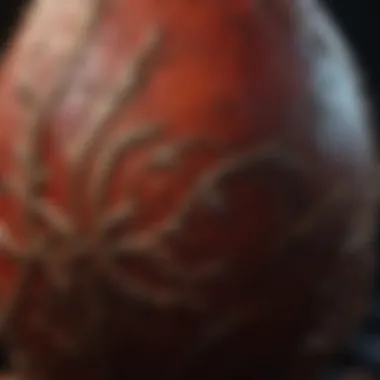
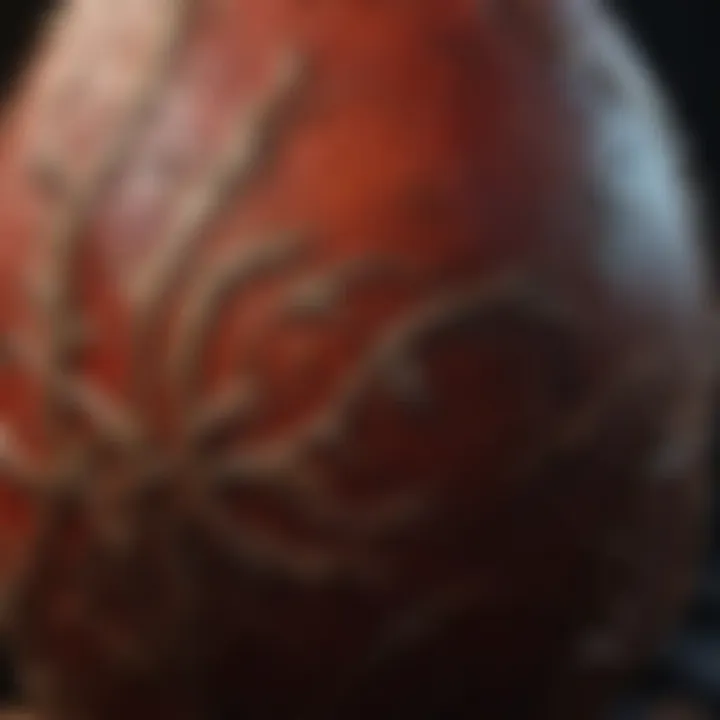
Symbolism and Themes Associated with Dragon Eggs
In the narrative of Game of Thrones, dragon eggs represent much more than mere objects. Their presence is deeply intertwined with the overarching themes of power, legacy, destruction, and rebirth. This section will explore how these themes manifest through the symbolism of dragon eggs and their significance in the development of the storyline and characters.
Power and Legacy
Dragon eggs are potent symbols of power and legacy within the Targaryen family. The Targaryens, known for their historic connection to dragons, possess a unique heritage that is inextricably linked to these enigmatic eggs. The imagery of a dragon egg evokes thoughts of strength and domination in Westeros. Owning a dragon egg not only signifies one’s claim to the Targaryen legacy but also represents the potential for immense power.
The display of dragon eggs plays a crucial role in asserting dominance among the noble houses. When Daenerys Targaryen acquires her eggs, it sparks a revival of the Targaryen legacy, enhancing her claim to the Iron Throne. The eggs symbolize her birthright. They remind viewers that the Targaryens once ruled with dragons flying above them, signifying their strength. This connection to power drives much of Daenerys’s actions throughout the series.
Additionally, dragon eggs also encapsulate the idea of legacy in a broader sense. The act of hatching dragons can be seen as a re-establishment of the Targaryen lineage. The legacy of past generations is echoed through the dragons that emerge, reasserting the importance of history and heritage in the quest for power. Thus, dragon eggs are not passive objects; they actively participate in the conversation about legacy and what it means to hold power in a turbulent world.
Destruction and Rebirth
The themes of destruction and rebirth are also closely tied to the essence of dragon eggs. They embody the cyclical nature of life, as seen in the transformation of the eggs into dragons. This metamorphosis represents the idea that destruction can lead to new beginnings.
In the series, dragons are often depicted as agents of both destruction and salvation. As Daenerys raises her dragons, they embody the potential for great chaos. Yet, they also represent hope and renewal for the people who suffered under tyrannical rule. Their capacity for destruction contrasts with their role in fostering growth and change.
The hatching of dragon eggs marks a turning point in Daenerys's journey. iIt signals her transition from a vulnerable princess into a formidable leader, capable of reshaping the world around her. This collision of destruction and rebirth serves to highlight the dual nature of power — it can liberate and oppress. The eggs serve as a reminder that every powerful force carries the potential for significant consequences, often threatening and beneficial.
In essence, dragon eggs are not just symbols of dragons but represent a complex layer of themes involving power, legacy, destruction, and rebirth. They encapsulate the struggles and evolution of characters throughout Game of Thrones, providing depth to the narrative and engaging the audience on multiple levels.
Dragon Eggs and Character Development
The role of dragon eggs in Game of Thrones extends beyond mere plot devices; they serve as pivotal elements in the character arcs of key figures like Daenerys Targaryen and others. This section explores the intricate connection between dragon eggs and character development, outlining how these mystical objects influence personal growth, moral dilemmas, and interpersonal relationships.
Daenerys Targaryen's Evolution
Daenerys Targaryen's journey is undeniably tied to her dragon eggs. Initially, these eggs represent her heritage and a lost legacy. They fuel her ambitions and symbolize hope for her rule over Westeros. The process of acquiring the dragon eggs itself unveils her tenacity and determination. She navigates complex relationships with men like Khal Drogo and her brother Viserys, who often stifle her development.
When Daenerys finally hatches the eggs, it marks a profound turning point in her character. She transitions from a pawn in others' games to a formidable power player. The dragons, born of the eggs, mirror her growth, as they too evolve from vulnerable creatures into symbols of destruction and dominance.
This relationship is not merely symbolic; it also encapsulates her struggle with identity and power. The duality of nurturing her dragons while recognizing the destruction they can cause becomes a recurring theme in her narrative, setting the stage for her complex choices in seeking power.
Impact on Other Characters
The influence of dragon eggs extends to several other characters in the series, shaping their motivations and actions. First, characters like Tyrion Lannister analyze Daenerys' relationship with her dragons, recognizing their potential to shift the balance of power. His observations and subsequent decisions reflect the strategic dynamics at play in Westeros.
Moreover, characters like Jon Snow experience a shift in their perspective as Daenerys’ dragons grow. Jon’s initial skepticism towards Daenerys' ambition evolves as he witnesses the power the dragons wield. The emergence of the dragons as significant forces in the narrative reinforces Jon's internal conflict regarding loyalty and allegiance.
Importantly, the dragon eggs catalyze alliances and enmities. Characters such as Cersei Lannister view Daenerys’ dragons as existential threats, prompting aggressive responses against her. The fear and respect commanded by the dragons ripple through the political landscape, leading to critical power struggles that affect character trajectories.
“The dragons are not just beasts—they’re embodiments of ambition, destruction, and legacy, encapsulating the very essence of power in the Game of Thrones universe.”
Cultural Impact of Dragon Eggs in the Fandom
The significance of dragon eggs extends beyond their narrative role, having a profound cultural impact on fans of Game of Thrones. The fascination with these mythical objects reflects deeper themes and ideas that resonate with audiences. This cultural phenomenon highlights the interplay between fictional worlds and the real lives of fans.
Fan Theories and Speculations
Throughout the series, dragon eggs inspire a variety of fan theories and speculations. The mystery surrounding their origin and powers encourages fans to engage in extensive discussions online. Sites like Reddit and social media platforms become hotbeds for these theories, allowing fans to delve deeper into the lore of Westeros.
Many fans have debated the significance of the three dragon eggs given to Daenerys Targaryen. Ideas about their connection with her lineage and the prophecy surrounding her rise to power attract considerable attention. This engagement promotes a vibrant culture of theorizing.
- Connection to the Targaryen Legacy: Fans speculate on how the dragon eggs symbolize the return of Targaryen dominance in Westeros.
- Symbolism of Rebirth: Theories often touch on themes of rebirth and transformation associated with the dragons.
- Unexpected Turns: Some fan predictions about the future of these dragons remain popular and have turned into competing theories, especially regarding their role in upcoming Spin-off series.
These discussions foster a sense of community, as fans come together to share ideas and insights, enhancing the overall experience of engaging with the franchise.
Merchandising and Collectibles
The cultural impact of dragon eggs is not limited to theories; it also extends into the realm of merchandising and collectibles. The popularity of these eggs has led to a variety of products that appeal to collectors and enthusiasts of the series.
Several companies have taken advantage of the dragon egg craze:
- Replicas: High-quality replicas of the dragon eggs have become sought-after items, often crafted with meticulous detail to mirror those in the show. Fans enjoy displaying these collectibles, emphasizing their love for the series.
- Video Games: Dragon eggs frequently appear in video games related to Game of Thrones. These games allow fans to interact with the lore, adding another layer of immersion.
- Official Merchandise: Clothing, accessories, and home decor featuring dragon eggs attract fans who want to express their affiliation with this beloved series.
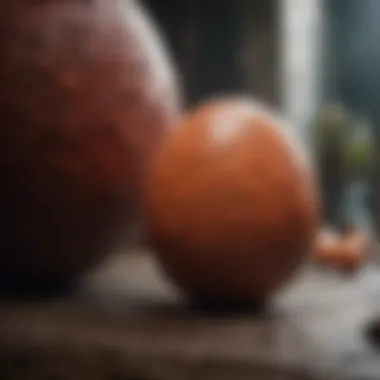
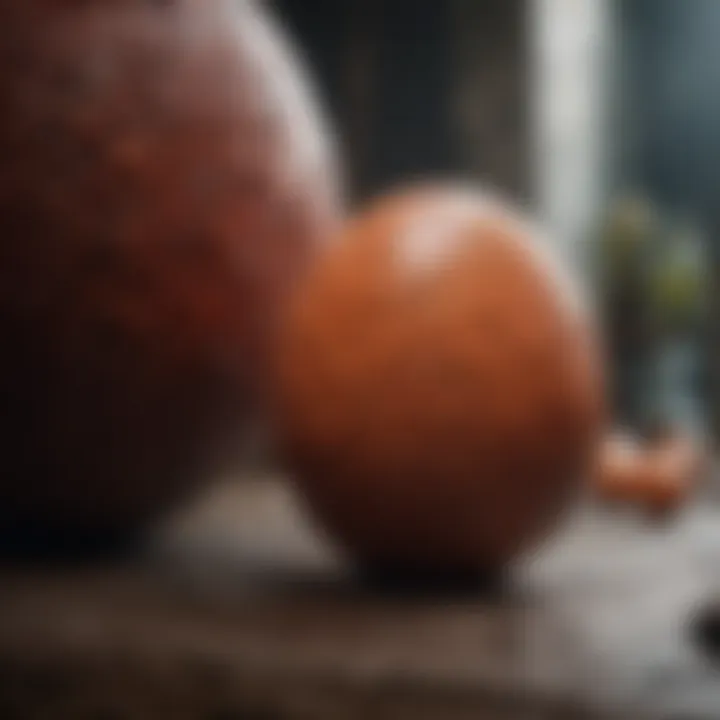
The commercialization of dragon eggs has become a way for fans to connect with the show beyond mere viewership. It reflects the widespread desire to carry a piece of this fantastical world into everyday life.
The impact of dragon eggs encompasses much more than the surface-level intrigue they create. They foster interaction among the fanbase, driving discussions and inspiring merchandise. As Game of Thrones continues to influence pop culture, the cultural significance of dragon eggs remains undeniably potent.
Comparative Analysis: Dragons Across Cultures
The concept of dragons varies widely across cultures, highlighting differing values, beliefs, and historical contexts. In the realm of Game of Thrones, draons and their representations in literature are steeped in rich cultural backgrounds that echo aspects of the real world. Understanding these variations allows for deeper insight into the symbolism and significance of dragon eggs within the narrative.
Dragons in Western Mythology
In Western mythology, dragons often embody chaos, destruction, and tyranny. They are frequently portrayed as malevolent creatures, representing the ultimate challenge that heroes must face. The dragon is a beast to be slain; it guards treasures such as gold, a symbol of power and wealth. Notable examples include the dragons in J.R.R. Tolkien's works or the legendary dragon slain by Saint George.
- Characteristics:
- Generally fearsome and aggressive.
- Associated with fire and devastation.
- Frequently hoards gold or treasure.
These Western dragons stand in sharp contrast to the portrayal of dragons in Game of Thrones, which presents a more complex archetype. The dragons in this series are not merely antagonistic; they have lineage, purpose, and, in some respects, a form of intelligence. They symbolize the resurgence of power for House Targaryen and evoke themes of rebirth and legacy, evident in their connection to Daenerys Targaryen.
Eastern Interpretations of Dragons
In Eastern cultures, particularly in China, dragons are revered as benevolent spirits, often associated with water and agricultural prosperity. They symbolize wisdom, power, and good fortune. Unlike their Western counterparts, Eastern dragons do not typically embody malevolence.
- Characteristics:
- Seen as protectors and symbols of good luck.
- Often connected to water, rainfall, and agricultural success.
- Associated with royalty and divine authority.
The dragons in these cultures reflect positive traits and are integral to various festivities, such as the Chinese New Year. This duality—where dragons can be fierce yet protective—complicates the analysis of dragons like those in Game of Thrones, which draws on both Western fears and Eastern reverence.
"The dragon is seen as a guardian in some cultures, not merely a creature to be slain."
By understanding both the Western view of dragons as proxies of fear and the Eastern perspective that embraces them as symbols of fortune, fans can appreciate the multifaceted narrative of dragon eggs and their implications in the Game of Thrones universe.
The Future of Dragon Eggs in the Franchise
The future of dragon eggs in the Game of Thrones franchise presents various narratives and possibilities. Their significance is deeply rooted in the lore established by George R.R. Martin. As the franchise expands through spin-offs and adaptations, the dragon eggs can serve as symbolic links to the past. Exploring this topic offers insights into how the legacy of these mythical creatures shapes both character arcs and overarching storylines.
Potential Developments in Spin-offs
With several Game of Thrones spin-offs in development, the role of dragon eggs could be crucial in establishing connections to the original series. The presence of dragon eggs can introduce new characters or revive old ones through their exploits and legacies. Notably, a series focusing on House Targaryen, such as House of the Dragon, could explore historical perspectives on dragons and their significance in Westeros.
Potential new stories might delve into the process of hatching dragon eggs or the Targaryens' attempts to maintain control over their dragons. These narratives could highlight the delicate balance between power and vulnerability within the Targaryen lineage. Moreover, bringing dragon eggs into newer storylines can invigorate the universe with renewed mythology, attracting viewers who seek depth and continuity.
Legacy of the Targaryens
The legacy of the Targaryens is inextricably linked with dragon eggs. These eggs symbolize both the grandeur and tragedy of the Targaryen bloodline. As the series continues to explore their history, dragon eggs represent an often dangerous allure of power. Each egg carries a story, a reminder of the triumphs and the downfalls of its keepers.
As new developments arise in the franchise, the exploration of how dragon eggs impact family dynamics and politics will be sure to capture interest. The Targaryen struggle for dominance, marked by the dragons, encompasses themes of ambition, betrayal, and the cyclical nature of desire for power. Each egg could represent potential emergence, tying future narratives back to the Game of Thrones lore while fostering anticipation for fans.
"Dragon eggs in Game of Thrones symbolize not just the Targaryens’ connection to dragons, but also their legacy of power, destruction, and rebirth."
Dragon eggs will likely remain a cornerstone in shaping the underlying principles of the Game of Thrones universe. By linking the past with the present, they will continue to captivate audiences and develop intriguing plot lines.
The End: The Enduring Allure of Dragon Eggs
In the intricate tapestry of the Game of Thrones narrative, dragon eggs stand as powerful symbols that resonate on multiple levels. Their existence is not merely a plot device; they represent heritage, potential, and the heavy burdens that come with power. This section reflects on why dragon eggs matter so deeply within the story and what they signify to the audience.
The Significance in the Narrative
Dragon eggs encapsulate the essence of the Targaryen legacy. They remind viewers of the family's tumultuous history. Each egg is tied closely to themes of rebirth and transformation. The resurrection of dragons from these eggs marks not just a return to power for Daenerys Targaryen but also evokes the hope and fear surrounding her quest for the Iron Throne.
Cultural Impact
The allure of dragon eggs extends beyond the narrative and into fan culture. Discussions, fan theories, and merchandise have proliferated around these iconic objects. The eggs are symbolic of the duality of love and destruction in Daenerys’s journey. They eternally draw fans to explore deeper meanings. Thus, the connection to dragon eggs reinforces their persisting relevance in the franchise.
"Dragon eggs are not just relics of a bygone era; they are the spark of a revolution in Westeros."
Legacy and Future Implications
Finally, the importance of dragon eggs can be seen in their potential for future stories within Game of Thrones’ universe. As prequels and spin-offs are developed, the lore surrounding dragon eggs is bound to resurface. They embody a legacy that influences narrative structures and character arcs, offering fertile ground for new explorations.
In summary, the enduring allure of dragon eggs lies in their rich symbolism and their profound effect on the storyline. They are more than mere artifacts; they are the heartbeats of Game of Thrones, echoing the voices of the past while shaping the paths of the future.



